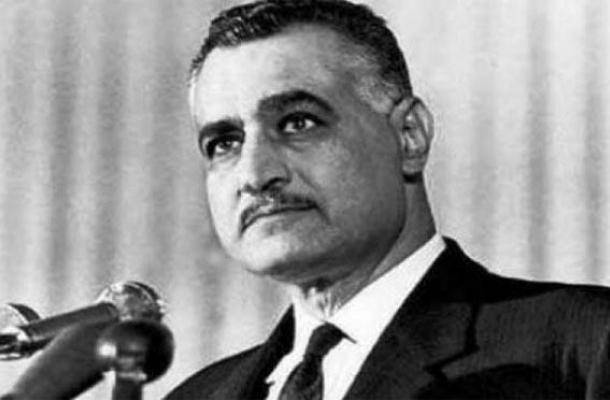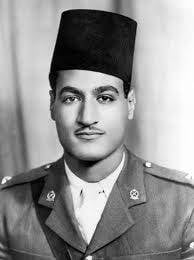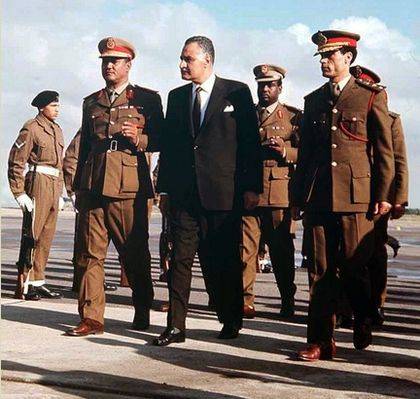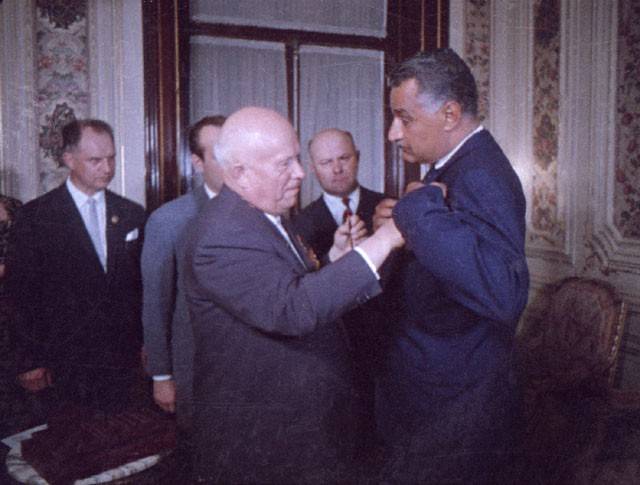"Father of the Arabs." One hundred years nasser
Nasser is a very ambiguous figure, causing the most controversial assessments not only by Western and Russian, but also by the Arab historians themselves, including Egyptian historians. But, be that as it may, this man, who had led Egypt for almost fifteen years, was also an extraordinary politician in the very difficult years of the Cold War, which was far from cold in the Middle East, and was completely remembered to be remembered after a century after his birth.

In the Arab world, the figure of Gamal Abdel Nasser is still revered by many supporters of secular nationalism. At one time, it was Nasser and his ideas that had a decisive influence on Arab nationalists in Libya, Algeria, Syria, Yemen, and many other countries. The Libyan leader Muammar Gaddafi considered Nasser to be his teacher. Even now, when the ideas of religious fundamentalism in the Middle East and North Africa pushed aside Arab secular nationalism, the memory of Nasser is honored in many countries. Egypt is no exception. In fact, it is Nasser who can be considered the founder of the political tradition that still retains its dominant influence in this largest Arab country.
Gamal Abdel Nasser Hussein (that is how his full name sounded) was born on January 15 1918 in Alexandria. He was the first child in the family of the newlyweds - postal employee Abdel Nasser and his wife Fahima, married in 1917 year. The family was not rich, and because of the nature of the service of the father often moved from place to place. In 1923, Nasser Sr. settled with his family in the city of Hatatba, and in 1924, the six-year-old Gamal was sent to his uncle in Cairo. In the 1928 year, Gamal was transferred to Alexandria - to her maternal grandmother, and in 1929, she was enrolled in a boarding school in Helwan.
In 1930, twelve-year-old Gamal participated in a political demonstration against colonialism and even spent the night at the police station. This detention was the beginning of the life of Gamal Abdel Nasser as an Arab revolutionary. In 1935, he led a demonstration of young students and was slightly injured during its dispersal. In his youth, Gamal was fond of reading the biographies of famous nationalist leaders and military leaders - Napoleon, Bismarck, Garibaldi. The life and views of Mustafa Kemal Ataturk had a great influence on him. Nasser decided to link his fate with a military career.
 In 1937, a young man applied to the Royal Military Academy in Cairo, but due to political unreliability he was denied admission to an educational institution. Then Nasser entered the Law College of the University of Cairo, but soon left his studies there and again made an attempt to enter the military academy. This time, the young man was supported by the Deputy Minister of War of Egypt, Ibrahim Khayri Pasha, after which Nasser was still enrolled in an educational institution. In July, 1938, with the rank of lieutenant Nasser, was released into the army and began serving in the garrison of the town of Mankabat. In 1941-1943 he served in Sudan, which was then under the Anglo-Egyptian administration, and in 1943 he returned to Cairo, taking the post of instructor of the military academy.
In 1937, a young man applied to the Royal Military Academy in Cairo, but due to political unreliability he was denied admission to an educational institution. Then Nasser entered the Law College of the University of Cairo, but soon left his studies there and again made an attempt to enter the military academy. This time, the young man was supported by the Deputy Minister of War of Egypt, Ibrahim Khayri Pasha, after which Nasser was still enrolled in an educational institution. In July, 1938, with the rank of lieutenant Nasser, was released into the army and began serving in the garrison of the town of Mankabat. In 1941-1943 he served in Sudan, which was then under the Anglo-Egyptian administration, and in 1943 he returned to Cairo, taking the post of instructor of the military academy.Already at the beginning of his service, Nasser was a staunch Arab nationalist and gathered around him a small group of officers who sympathized with his ideas. This group included Anwar Sadat - also the future president of Egypt. During World War II, the Arab nationalists, and Nasser were no exception, did not hide their sympathies for the Axis countries, hoping that Hitler would crush the power of the British Empire and thereby contribute to the national liberation struggle of the Arab countries.
However, the Second World War ended with the defeat of the Axis countries. In 1947-1949 Egypt took part in the Arab-Israeli war. Naser, who noticed that the Egyptian army was not prepared for military operations, also went to the front. It was during the war that Nasser began work on one of his program works, The Philosophy of Revolution. Returning from the front, Nasser continued to serve in the military academy, combining it with underground activities. In 1949, the Free Officers Society was created, which initially included 14 people. Nasser was elected chairman of the society.
Further activation of the Egyptian revolutionaries was associated with the events around the Suez Canal. 25 January 1952 in the city of Ismailia clashed between British troops and the Egyptian police, killing about 40 police, which caused a storm of public indignation in the country. In this situation, Nasser and his associates decided that the time had come to act more actively.
However, at first, Lt. Col. Nasser did not expect that he would be able to lead the revolution against the royal regime, accused by revolutionaries of complicity with the British colonialists. Therefore, the role of the head of the conspiracy went to the commander of the ground forces, Major General Mohammed Naguib. Although, as a politician, Naguib clearly lost to Nasser, he was above him in military rank and place in the military hierarchy. 22 — 23 July 1952, the army took control of key facilities in the capital. King Farouk was sent to an honorary exile, and a year later, 16 June 1953, Egypt was officially proclaimed a republic. Major General Mohammed Nagugh became President of the country. All power in the country was in the hands of a special body - the Revolutionary Command Council, whose chairman was General Nagugh, and the deputy chairman was Lieutenant Colonel Nasser.
However, in the changed political situation between Naguib and Nasser, contradictions sharpened. Nasser spoke with a more radical program and counted on the further development of the Arab revolution. In February 1954 of the year, the Revolutionary Command Council met without Naguib, in March, Nasser launched reprisals against the supporters of the general, and in November 1954, General Naguib was finally removed from his post as president of the country and placed under house arrest. So power in Egypt was in the hands of Gamal Abdel Nasser, who instantly protected himself from potential rivals, arresting many representatives of opposition organizations of various kinds - from fundamentalists from the Muslim Brotherhood to the Communists from the Egyptian Communist Party. In June 1956, Gamal Abdel Nasser was elected president of the country.
The key idea of Gamal Abdel Nasser in the first years of his presidency was to strengthen Egyptian statehood, above all - to ensure the true sovereignty of the country. The main obstacle to this Nasser believed the continued control of Britain over the Suez Canal. 26 July 1956, Nasser made a statement in which he announced the nationalization of the Suez Canal and again strongly criticized the policy of British colonialism. The channel was closed for any ships of the state of Israel. The result of the nationalization of the channel was the Suez crisis, which resulted in the fighting of Israel, Britain and France against Egypt in 1959. The conflict was "extinguished" by joint efforts of the USA and the USSR. The actual failure of the Israeli intervention provided an unprecedented growth in the popularity of Nasser, both in Egypt and beyond, primarily in the Arab world.
Gamal Abdel Nasser, not alien to the pan-Arab views, claimed the role of the unconditional political leader of the Arab world. To some extent, he was right, because in the second half of the 1950's. in the Arab world there was no other equally charismatic politician capable of competing with Nasser. The US tried as an alternative to support the King of Saudi Arabia, but the popularity of the latter among the many millions of disadvantaged Arabs in the Middle East and North Africa was out of the question. Nasser, on the contrary, was regarded as a popular leader, able to oppose Western colonialism and lead the standoff between Arabs and Israel.

The unification of Egypt and Syria in the UAR - the United Arab Republic - was largely associated with the name Nasser. The unification initiative came from the Syrian side, which was able to put pressure on Nasser, who initially did not want to create a unified state. However, it was Nasser who became the president of the UAR with four vice-presidents - two from Egypt and two from Syria.
Being a supporter of Arab nationalism, Nasser adhered to his own version of Arab socialism, connecting the future of the Arab world with the socialist system. The core of Nasser’s economic policy was the nationalization of large-scale industry and strategically important industries, primarily enterprises owned by foreign capital. The social program of Nasser was very progressive, why the Egyptian president is still remembered with a kind word. Thus, the Nasser program provided for the introduction of a minimum wage, the creation of free education and free medicine, the construction of affordable housing, the accrual of a share of profits to workers of enterprises. At the same time, Nasser was pursuing an agricultural reform aimed at limiting the positions of large landowners and protecting the interests of peasant tenants. A huge contribution was made by Nasser in strengthening the defense capacity of the Egyptian state, in the development of modern industry in the country, the construction of power plants, transport and social infrastructure facilities.
During the reign of Nasser, Egypt really began to change, turning from a feudal monarchy, which it was before 1952, into a relatively modern state. At the same time, Nasser pursued a policy of secularization at a heightened pace - recognizing the significance of Islamic values, he nevertheless sought to limit the influence of religion on the life of the Egyptians. The main blow of the repressive apparatus was inflicted on religious-fundamentalist organizations, primarily on the Muslim Brotherhood.
Nasser greatly supported the national liberation movements in the Arab world, including making an enormous contribution to achieving political independence for Algeria, which became a sovereign state in 1962. In the same year 1962, the monarchy was overthrown in Yemen, and the anti-monarchist revolution was led by Colonel Abdullah Al-Salyal, chief of the General Staff of the Yemeni army, known for his sympathies for nasserism. Since the ousted Imam, King Mohammed Al Badr, was supported by Saudi Arabia and he began an armed struggle against revolutionaries, Egypt became involved in the Yemeni conflict and only in 1967 did the Egyptian troops who participated in the Yemeni civil war leave the country.
Despite the fact that in domestic politics, Nasser did not complain of the Egyptian communists and conducted repressions against them, he managed to maintain very good relations with the Soviet Union. On the initiative of Nikita Khrushchev, who clearly sympathized with Nasser, in 1964, Gamal Abdel Nasser was awarded the title Hero of the Soviet Union. The Golden Star of the Hero was also received by field marshal Abdel Hakim Amer, the closest to that period. Khrushchev’s decision caused well-founded criticism from many Soviet citizens, including party leaders, because, firstly, Nasser’s merits for the Soviet Union were not so significant for such a high award, and secondly, Nasser was not really a friend of the Egyptian Communists many of which rot in the prisons of Egypt. There was another piquant moment in Nasser’s biography - the Egyptian president favored former Nazi war criminals, many of whom not only took refuge in Egypt at the beginning of 1950, but were also accepted as advisers and instructors for service in the Egyptian special services, army and police.

The most serious political defeat of Nasser was the Six-Day War in June 1967, during which Israel defeated a coalition of Arab countries for six days, which included Egypt, Syria, Jordan, Iraq and Algeria. Naser accused Field Marshal Amer, who 14 of September 1967, committed suicide in the defeat of the Egyptian army. Despite the failure of the Six Day War, Nasser continued the course of armed confrontation with Israel, calling it a "war of attrition." The low intensity fighting continued in 1967-1970. in order to return under the Egyptian control of the Sinai Peninsula.
28 September 1970, as a result of a heart attack, Gamal Abdel Nasser died at the age of 52. Although there is a common version about the poisoning of the Egyptian president, do not forget that he suffered from diabetes and was very dependent on smoking, and both his brothers also died of heart disease, before they reach the age of 60. The funeral of Gamal Abdel Nasser, held on October 1 1970, gathered about 5 million people. This was not surprising - the untimely death of Nasser deeply shook the entire Arab world, in which there was no longer a leader comparable in popularity to the Egyptian president. “Arabs are orphaned” - with such headlines came out on the day Nasser died, newspapers in many countries of the Middle East and the Maghreb.
Information